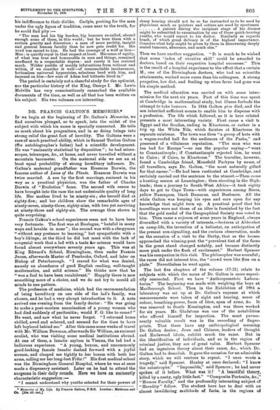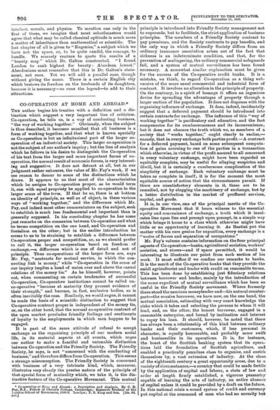DR. FRANCIS GALTON'S MEMORIES.*
we begin at the beginning of Dr. Galton's Memories, we find ourselves plunged, so to speak, into the midst of the subject with which his name is specially connected. He tells us mud) about his progenitors, and in so doing brings into strong relief the great fact of heredity. The Galtons were a race of much practical ability, which in Samuel Tertius Galton (the antobiographer's father) had a scientific development. He was "eminently statistical by disposition "; he had micro- scopes, telescopes, Sm., at home, and never travelled without a mountain barometer. On the maternal side we see an at least equal probability of strong hereditary influence. Dr. Galton's maternal grandfather was Erasmus Darwin, the famous author of Loves of the Plants. Erasmus Darwin was twice married. A son by the first marriage, eminent in his way as a practical physician, was the father of Charles Darwin of "Evolution" fame. The second wife seems to have brought into the race the not undesirable quality of long life. Her mother lived to be ninety-six ; she herself died at eighty-five; and her children show the remarkable ages of ninety-seven, ninety-three, eighty-nine, with two yet surviving at ninety-three and eighty-six. The average thus shown is quite surprising.
Francis Galton's school experiences seem not to have been very fortunate. The first was at Boulogne, "hateful in many ways and lovable in none" ; the second was with a clergyman "without any pretence to learning," but sympathetic with a boy's likings; at the third he did but meet with the lack of congenial work that a lad with a taste ior science would have found almost everywhere seventy years ago. This was at King Edward's School, Birmingham, then under Francis Jenne, afterwards Master of Pembroke, Oxford, and later on Bishop of Peterborough. "I craved for what was denied, namely an abundance of good English reading, well-taught mathematics, and solid science." He thinks now that be "was a fool to have been recalcitrant" Happily there is now something more of a choice, and we do not try to mould all minds to one pattern.
The profession of medicine, which had the recommendation of being hereditary on one side of the lad's family, was chosen, and be had a very abrupt introduction to it. A note arrived one evening from the family doctor : "He was going to make a post-mortem examination of a young woman who had died suddenly of peritonitis; would F. G. like to come P " Be went, and saw what he never forgot. "I returned home chilled, awed and sobered, and seemed for the time to have left boyhood behind me." After this came some weeks of travel with Mr. William Bowman, afterwards Sir William, an eminent oculist, who was visiting some medical institutions abroad. At one of them, a lunatic asylum in Vienna, the lad had a ludicrous experience. "A young, buxom, and uncommonly good-looking female lunatic dashed forward with a joyful scream, and clasped me tightly to her bosom with both her arms, calling me her long-lost Fritz !" His first medical school was the Birmingham General Hospital, where he was at once made a dispensary assistant. Later on he had to attend the surgeons in their daily rounds. Here we have an eminently characteristic suggestion :- "I cannot understand why youths selected for their powers of • Memories of My Life. By Francis Galion, P.E.S. London Methuen and CO. [10e. ed, net.] sharp hearing should not be so far instructed as to be used by physicians much as pointers and setters are used by sportsmen . . . . . . A patient daring the incipient stage of his disease might be submitted to examination by one of these quick-hearing youths, who would report to his doctor. Similarly as regards touch, of which great delicacy is of the highest importance. Conceive what help might be given by them in discovering deeply seated tumours, abscesses, and much else."
Then we have another suggestion. "It is much to be wished that some 'index of curative skill' could be awarded to, doctors, based on their respective hospital successes." This is the result of a hospital experience to the effect that a certain M., one of the Birmingham doctors, who bad no scientific attainments, worked more cures than his colleagues. A strong purgative, low diet, and feeding up when fever had gone was his simple method.
The medical education was carried on with some inter- mission for the next six years. Part of this time was spent at Cambridge in mathematical study, but illness forbade the attempt to take honours. In 1844 Galion pre died, and the son inherited sufficient means to enable him to dispense with a profession. The life which followed, as it is here related presents a most interesting variety. First came a visit tc Egypt and the Soudan, ending in Khartoum, or rather in a trip up the White Nile, which finishes at Khartoum itf separate existence. The town was then "a group of huts with a wagon-roofed hall for the audiences of the Pasha," and possessed of a villainous reputation. "The man who was too bad for Europe "—so ran the popular saying—" went to Constantinople ; if Constantinople rejected him, he went to Cairo ; if Cairo, to Khartoum." The traveller, however, found a Cambridge friend, Mansfield Parkyns by name, of all travellers, says Dr. Galton, "the most naturally gifted for that career."—He had been rusticated at Cambridge, and certainly carried out the sentence to the utmost. —Then c.iime a bunting season at Leamington ; then shooting in the High- lands; then a journey to South-West Africa—it took eighty days to get to Cape Town—with experiences among Boers, yellow Namaquas, black Damaras, and Bushmen. All the while Galion was keeping his eyes and ears open for any knowledge that might turn up. A practical proof that his travellings were not those of an idler is furnished by the fact that the gold medal of the Geographical Society was voted to him. Then came a sojourn of some years in England, always diversified with a variety of interests,—lectures at .Aldershot on camp-life, the invention of a heliostat, an anticipation of the present sun-signalling, and the curious observation, made on the occasion of a visit to the Derby, that as the horses approached the winning-post the "prevalent tint of the faces in the great stand changed notably, and became distinctly more pink under the flush of excitement" Herbert Spencer was his companion in this visit The philosopher was scornful ; the races did not interest him, the "crowd were like flies on a plate." Nevertheless he went again.
The last five chapters of the volume (17-21) relate te subjects with which the name of Dr. Galton is more especi-
ally connected. First we have " Anthropometric Labora- tories." The beginning was made with weighing the boys at Marlborough School. Then in the Exhibition of 1884 a laboratory was set up at Dr. Galton's expense at which measurements were taken of sight and hearing, sense of
colour, breathing-power, force of blow, span of arms, die. It was removed to South Kensington, and was there worked
for six years. Mr. Gladstone was one of the notabilities. who offered himself for inspection. The most perma- nently valuable result was in the recording of finger-
prints. That these have any anthropological meaning Dr. Gallon denies ; Jews and Chinese, leaders of thought and Earlswood idiots, exhibit much the same. But in the identification of individuals, and so in the region of criminal justice, they are of great value. Herbert Spencer' bad an ingenious theory about their cause, Sze., which Dr. Galion had to demolish. It gave the occasion for an admirable story, which we will venture to repeat "I once wrote a tragedy," said Spencer. Huxley at once declared: "I know
the catastrophe." "Impossible," said Spencer ; he had never spoken of it before. What was it P "A beautiful theory,
killed by a nasty, ugly little fact." "Composite Portraits, Ac.," "Human Faculty," and the profoundly interesting subject of
"Heredity" follow. The student here has to deal with air almost bewildering multitude of fade, in the regions of
intellect, morals, and physics. To mention one only in the first of these, we imagine that most schoalmasters would agree that what may be called classical aptitude is much more a matter of inheritance than mathematical or scientific. The last chapter of all is given to "Eugenics," a subject which we have not the space, or, to be quite candid, the courage, to handle. We scarcely venture to quote the results of a "beauty map" which Dr. Gallon constructed. "I found London to rank highest for beauty : Aberdeen lowest." Aberdonians must remember that this is Dr. Galton's state- ment, not ours. Yet we will add a parallel case, though without giving the name. There is a certain English city which bestows its freedom on the husbands of its daughters, because it is necessary—so runs the legend—to add to their attractions.

































































 Previous page
Previous page